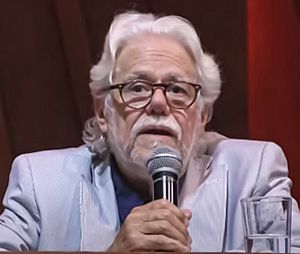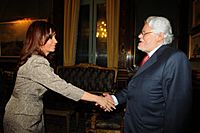Carlos Gaviria Díaz facts for kids
Quick facts for kids
Carlos Gaviria Díaz
|
|
|---|---|
 |
|
| Senator of Colombia | |
| In office 20 July 2006 – 20 July 2010 |
|
| Magistrate of the Constitutional Court of Colombia | |
| In office 1 March 1993 – 1 March 2001 |
|
| Personal details | |
| Born |
Carlos Emilio Gaviria Díaz
8 May 1937 Sopetrán, Antioquia, Colombia |
| Died | 31 March 2015 (aged 77) Bogotá, Colombia |
| Political party | Alternative Democratic Pole |
| Other political affiliations |
Social and Political Front |
| Spouse | María Cristina Gómez Toro (1966-present) |
| Children | Juan Carlos Gaviria Gómez Ana Cristina Gaviria Gómez Natalia Gaviria Gómez Ximena Gaviria Gómez |
| Alma mater | University of Antioquia (LLB, LLD) Harvard Law School (MA) |
| Profession | Lawyer |
Carlos Emilio Gaviria Díaz (born May 8, 1937 – died March 31, 2015) was an important Colombian lawyer, professor, and politician. He served as the 5th Chief Magistrate of the Constitutional Court of Colombia. A Chief Magistrate is like the main judge of a special court that makes sure laws follow the country's constitution. He was a Magistrate (judge) in this court from 1993 to 2001.
After leaving the court, he became a politician. He was elected as a Senator of Colombia in 2002. In 2006, he ran for President of Colombia as a candidate for the Alternative Democratic Pole party. He lost the election to the former president, Álvaro Uribe Vélez, who was running for his second term.
Contents
Carlos Gaviria's Life and Work
Carlos Gaviria Díaz was a very respected person in Colombia. He was known for his strong beliefs in human rights and justice. He dedicated his life to teaching, judging, and working in politics to improve his country.
Becoming a Lawyer and Professor
Carlos Gaviria studied at the University of Antioquia, where he earned his law degree in 1961. He then received a special scholarship called a Ford Fellowship. This allowed him to study at Harvard Law School in the United States. He learned from famous professors there and earned a Master of Arts degree in 1971.
After returning to Colombia, he continued his studies at the University of Antioquia. He earned his Doctorate of Law and Political Science in 1965. His special paper, called a thesis, was highly praised.
He then became a professor at his old university, the University of Antioquia. He held many important positions there. He was the Dean (head) of the Law Faculty from 1967 to 1969. He also directed the Public Law Department for several years.
In 1980, he started working for human rights in Medellín. Because of his work, he faced threats and had to leave Colombia for a while. He went to Argentina for safety. Later, he returned and continued his work at the university. He became the Deputy Rector (a high-ranking leader) of the university from 1989 to 1992.
One of his students was Álvaro Uribe Vélez, who later became president. Even though they started with similar political ideas, their views changed over time. They became political opponents in the 2000s.
His Time as a Judge
Carlos Gaviria started his career as a judge in 1961 in Rionegro. But he soon returned to Medellín to teach at the university.
In 1992, he was chosen to be a judge for the new Constitutional Court of Colombia. This court was created by the Colombian Constitution of 1991. Its job is to make sure all laws follow the country's constitution. Carlos Gaviria became a judge on March 1, 1993, and served for 8 years.
On March 1, 1996, he was elected as the Chief Magistrate of the Constitutional Court. This meant he was the main judge of the court. He held this important position until March 1, 2001, when his term as a judge ended.
His Political Journey
In 2002, Carlos Gaviria was elected as a Senator of Colombia. He represented a left-wing political group called the Social and Political Front. He received a lot of votes in that election.
He decided to run for President of Colombia in 2006. He was the candidate for the Alternative Democratic Pole party. He won his party's nomination over another politician, Antonio Navarro.
Before the election, polls showed that Carlos Gaviria was in second place. He was behind the current President Álvaro Uribe. He lost the election to President Uribe in May 2006. Uribe won with about 62% of the votes, while Gaviria received about 22%.
What Carlos Gaviria Believed In
Carlos Gaviria wanted to change Colombia's economic system. He believed it made the rich richer and the poor poorer. He wanted to reduce this gap between rich and poor people. He thought that the government should have more control over the economy to help everyone.
He was also a strong supporter of Colombia's 1991 Constitution. He believed that the parts of the constitution about human rights and political rights should be fully followed.
How He Performed in Elections
Here are some details about his election results:
| List | Party | Total Votes | Percent of Total | Seats won | Stronghold |
|---|---|---|---|---|---|
| 517 | Social and Political Front | 116,067 | 1.156% | 1 | Capital District |
| Candidate | Party | Total Votes | Percent of Total |
|---|---|---|---|
| Álvaro Uribe Vélez | Colombia First | 7,397,835 | 62.35% |
| Carlos Gaviria Díaz | Alternative Democratic Pole | 2,613,157 | 22.02% |
| Horacio Serpa Uribe | Liberal | 1,404,275 | 11.83% |
| Antanas Mockus Šivickas | Indigenous Social Alliance | 146,583 | 1.23% |
| Enrique Parejo González | National Democratic Reconstruction | 42,652 | 0.35% |
| Álvaro Leyva Duran | National Movement for Reconciliation | 18,263 | 0.15% |
| Carlos Arturo Rincón Barreto | Communal and Communitarian Movement | 15,388 | 0.12% |
Personal Life
Carlos Emilio Gaviria was born on May 8, 1937, in Sopetrán, a town in the Antioquia region. His parents were Carlos Gaviria Arango and Maruja Díaz Holguín.
He met María Cristina Gómez Toro in Spain in 1966. They got married later that year on December 16 in Medellín. They had four children together: Juan Carlos, Ana Cristina, Natalia, and Ximena. Carlos Gaviria considered himself an agnostic, meaning he wasn't sure if God existed. However, he grew up in a Roman Catholic family.
See also
 In Spanish: Carlos Gaviria Díaz para niños
In Spanish: Carlos Gaviria Díaz para niños
- José Gregorio Hernández Galindo
- Jaime Araújo Rentería
 | Charles R. Drew |
 | Benjamin Banneker |
 | Jane C. Wright |
 | Roger Arliner Young |


